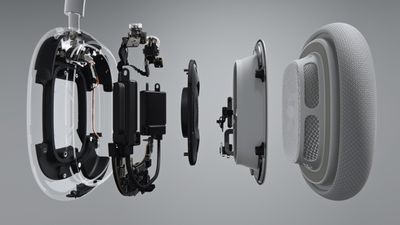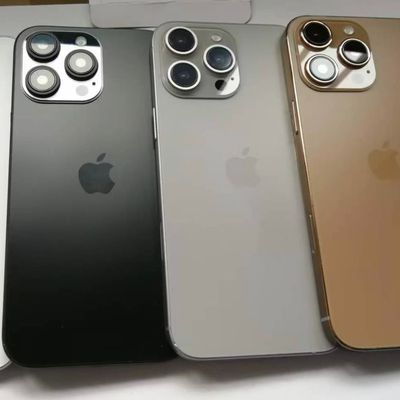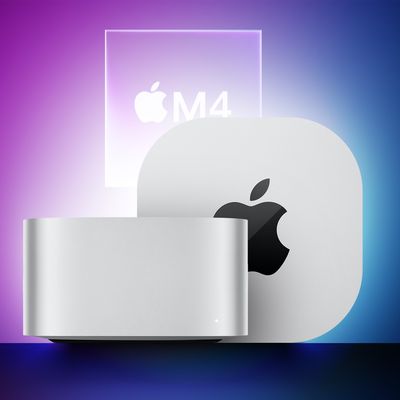AirPods Max Don't Contain U1 Chip for Ultra Wideband
Apple's new AirPods Max headphones are not equipped with a U1 chip for Ultra Wideband, according to Apple's tech specs, and confirmed by MacRumors. (This chip is not to be confused with the H1 audio chip in each of the AirPod Max's ear cups.)

First introduced in iPhone 11 models last year, the U1 chip enables improved spatial awareness. The distance between two devices that support Ultra Wideband can be measured precisely by calculating the time that it takes for a radio wave to pass between them, with much more accuracy than Bluetooth LE and Wi-Fi.
Apple's rollout of the U1 chip has been inconsistent, with all iPhone 11 and iPhone 12 models, Apple Watch Series 6 models, and the HomePod mini equipped with the chip, but not the second-generation iPhone SE, Apple Watch SE, or the latest iPad, iPad Air, and iPad Pro models. Apple has also yet to release a Mac with Ultra Wideband support.
Apple's use of Ultra Wideband technology has been limited so far, such as a directional AirDrop feature in iOS 13 and later, but the company has promised more exciting use cases in the future. One of those use cases will likely be its long-rumored AirTags items trackers, which analyst Ming-Chi Kuo has previously said will support Ultra Wideband, which should allow users to locate their lost items with greater accuracy.
Multiple leakers had suggested the AirPods Max (which were dubbed AirPods Studio in rumors) would be equipped with the U1 chip, including Jon Prosser.
Popular Stories
Leaker Sonny Dickson is back today with a new dummy unit image showing all four iPhone 16 Pro color variants, including the rose gold or "bronze" unit that replaces Blue Titanium in the existing iPhone 15 Pro models. The iPhone 16 Pro models are expected to come in black, white or silver, gray or "Natural Titanium," and a rose or rose gold color replacing Blue Titanium, according to Apple...
Multiple rumors have suggested that the iPhone 16 models are going to have an all-new button that's designed to make it easier to capture photos when the devices are held in landscape mode. Apple calls the button the Capture Button internally, and it is going to be one of the most advanced buttons that's been introduced to date with support for multiple gestures and the ability to respond to ...
Apple typically releases its new iPhone series in the fall, and a possible September 10 announcement date has been floated this year, which means we are just one month away from the launch of the iPhone 16. Like the iPhone 15 series, this year's lineup is expected to stick with four models – iPhone 16, iPhone 16 Plus, iPhone 16 Pro, and iPhone 16 Pro Max – although there are plenty of design...
Apple's iPhone 16 series is expected to debut in September 2024. This release follows Apple's trend of introducing new iPhone models annually in the fall. While the exact date has yet to be officially confirmed, the day of Tuesday, September 10 has been rumored as a possible announcement date, and September has traditionally been the month when Apple unveils its latest smartphone innovations. ...
Apple is moving forward with its project to develop a tabletop robotic device, according to Bloomberg's Mark Gurman. Subscribe to the MacRumors YouTube channel for more videos. The device would feature a large iPad-like display mounted on a "thin robotic arm" that would allow the display to tilt and up and down and rotate a full 360º, and it would serve as a "smart home command center," a...
It's almost September, but Apple still has multiple new product launches planned for 2024. New iPhone 16 models and Apple Watches are coming in September, and we're also going to get at least three Mac updates with M4 chips this year, according to rumors. Here's what's on the horizon. MacBook Pro Apple plans to refresh both the 14-inch and 16-inch MacBook Pro models, adding M4 chips. The ...
T-Mobile was fined $60 million by the Committee on Foreign Investment in the US (CFIUS) for negligence surrounding data breaches, reports Reuters. CFIUS penalized T-Mobile for failing to prevent or disclose unauthorized access to sensitive customer data. When T-Mobile merged with Sprint, it signed a national security agreement with CFIUS, which is what led to the fine earlier this year....





















